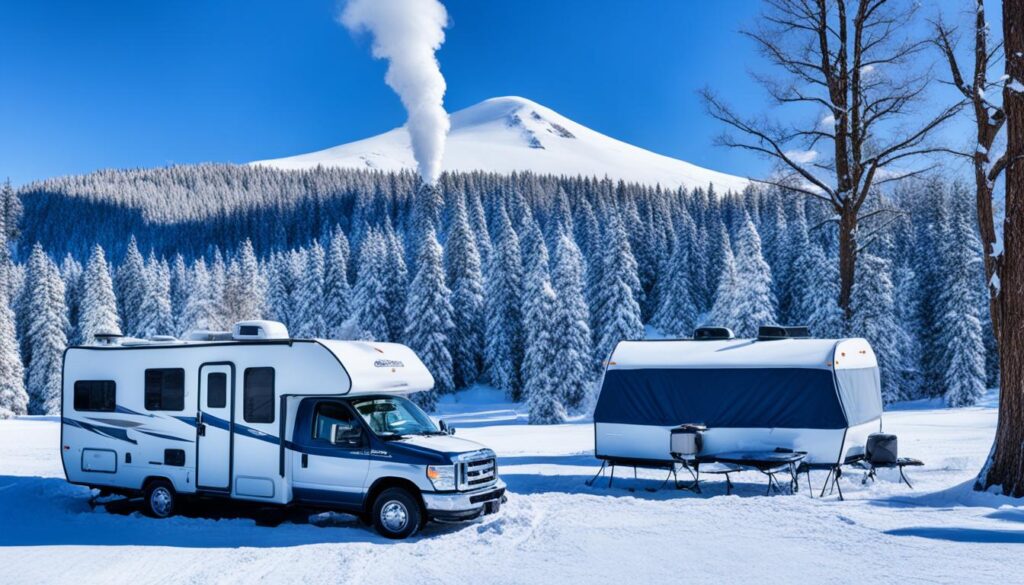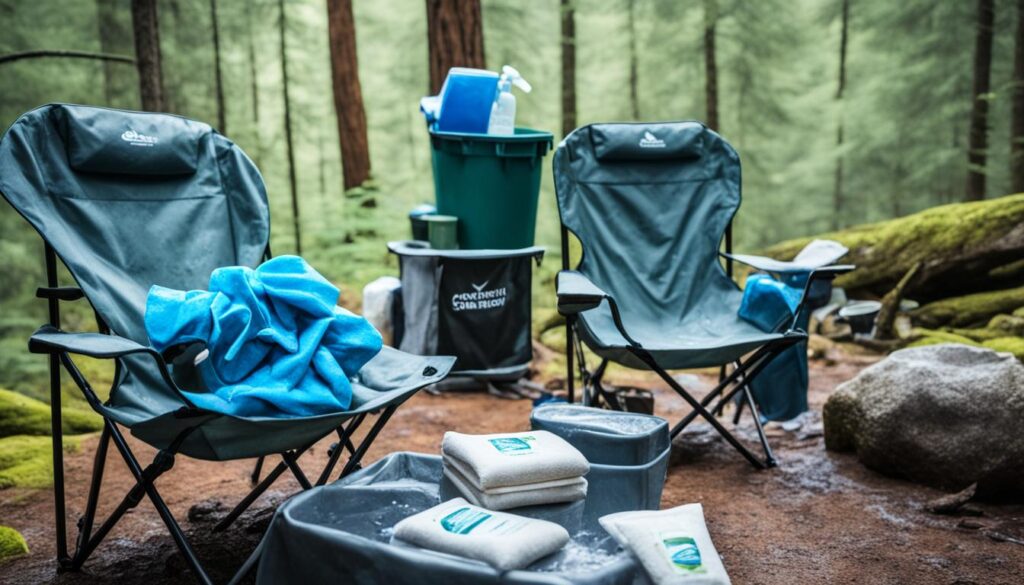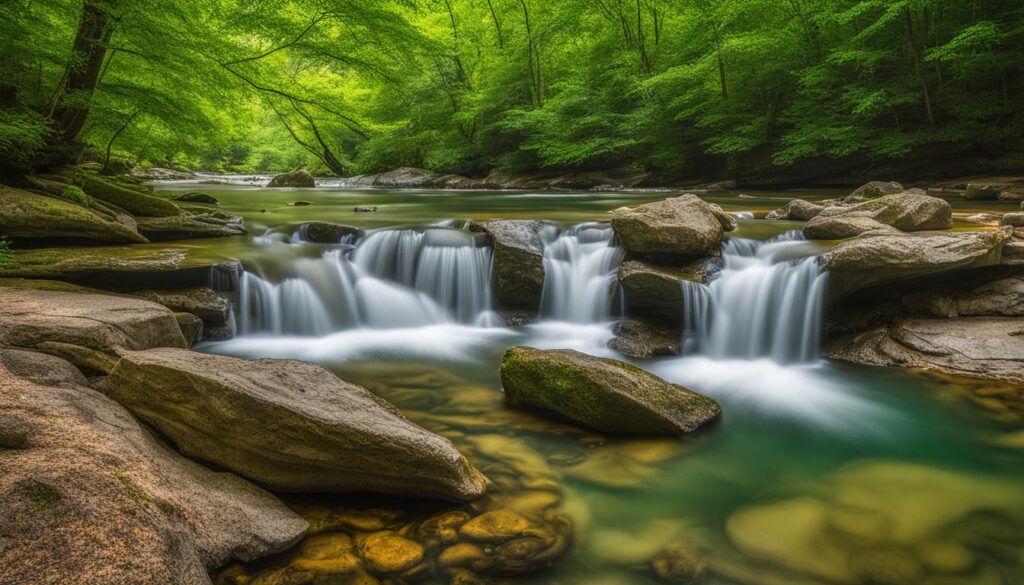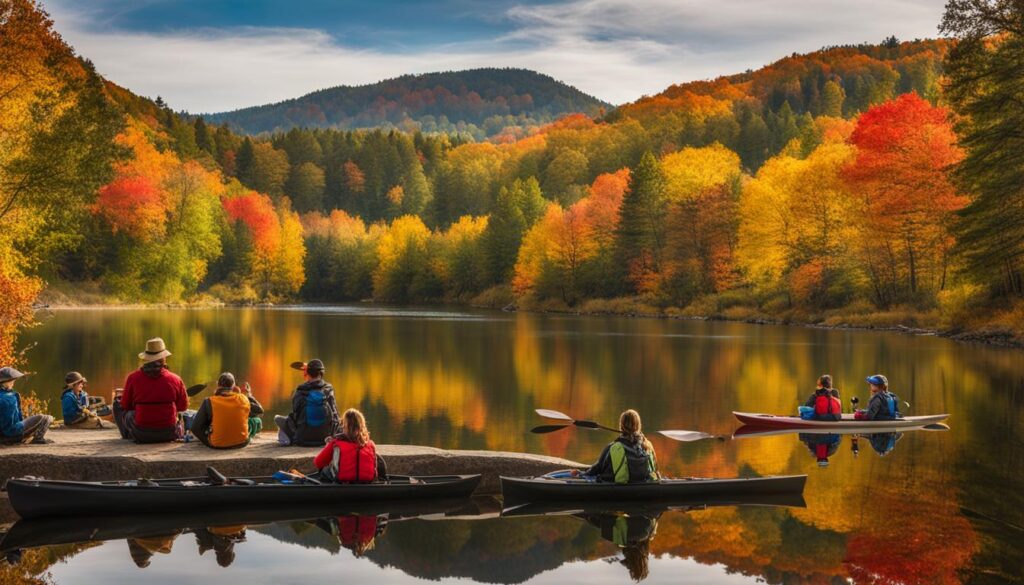Winterizing a camper is an important step to protect it during the cold winter months. But how long can a camper stay winterized before risking any damage? The duration of winterization depends on the method used and the climate. In general, a camper can stay winterized for 2-3 years, even in freezing temperatures, but the condition of the camper upon de-winterization may vary depending on the method used.
Key Takeaways
- A camper can stay winterized for 2-3 years, even in freezing temperatures.
- The duration of winterization depends on the method used and the climate.
- When de-winterizing, the condition of the camper may vary depending on the winterization method.
- Maintenance during winterization is crucial to prevent costly repairs.
- Finding the right storage location is essential to ensure the safety of a winterized camper.
Contents
Winterization Methods and Duration
When it comes to winterizing a camper, there are two main methods: the RV antifreeze method and the blow out the lines method. Each method offers different benefits and has varying durations for winter storage.
RV Antifreeze Method
The RV antifreeze method involves using a specialized antifreeze solution to protect the plumbing system and prevent freezing. This method is especially popular in regions with extremely cold winters. The RV antifreeze is poured into the plumbing system, ensuring that all water is replaced with the antifreeze solution to prevent any residual water from freezing and causing damage.
One of the key advantages of the RV antifreeze method is its durability. Using RV antifreeze can keep a camper winterized for several years. The antifreeze effectively keeps the seals and moving parts in good condition, ensuring that the camper remains protected even in freezing temperatures.
Blow Out the Lines Method
The blow out the lines method involves removing all water from the camper’s plumbing system using compressed air. This method is commonly used in regions that experience less severe winters or for campers that don’t have access to RV antifreeze.
By blowing out the lines, all residual water is expelled from the system, preventing any potential damage due to freezing. While the blow out the lines method may not provide the same level of protection as RV antifreeze, it can still prolong the winterization of a camper.
It is important to note that regardless of the method used, proper tools and preventive measures must be taken to ensure the camper remains in good condition during the extended winterization period.
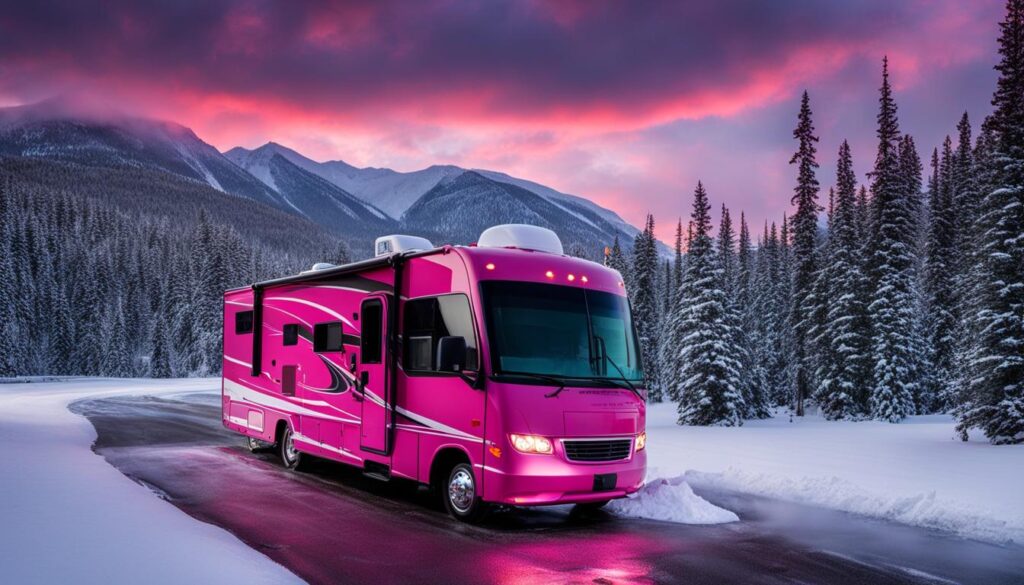
Note: For a comprehensive comparison between the RV antifreeze method and the blow out the lines method, refer to the table below:
| Winterization Method | Duration | Benefits |
|---|---|---|
| RV Antifreeze Method | 2-3 years | – Effective protection – Keeps seals and moving parts in good condition – Suitable for extremely cold winters |
| Blow Out the Lines Method | Varies | – Can prolong winterization – Suitable for regions with less severe winters – Requires compressed air |
Maintenance During Winterization
Performing winterization maintenance is crucial to protect your camper from costly repairs and damage during the cold winter months. By carefully inspecting key areas and taking preventive measures, you can ensure that your camper remains in good condition until it’s time to de-winterize. Here are some important maintenance tasks to consider:
Inspecting Seals and Roof
One of the first steps in winterizing your camper is to inspect the seals and roof for any signs of damage or wear. Check for cracks, gaps, or loose seals that could lead to leaks, as water damage can cause significant problems. Make any necessary repairs or replacements to ensure a watertight seal and protect your camper from moisture intrusion during winter storage.
Protecting the Plumbing System
Protecting the plumbing system from freezing is essential to prevent burst pipes and costly water damage. Before winterizing, drain the water from the plumbing system and flush it completely to remove any remaining water. Then, use RV antifreeze to fill the pipes, tanks, and other plumbing components. This will protect them from freezing temperatures and ensure they’re in good condition when it’s time to de-winterize.
Preventing Mold Growth
Mold growth can be a common problem in closed, humid environments, such as a stored camper. To prevent mold growth during winter storage, take proactive measures to enhance air circulation and reduce humidity levels. Open windows or vents periodically to allow fresh air to circulate, use dehumidifiers or moisture absorbers, and clean surfaces regularly with mold-inhibiting products.
Tip: To enhance air circulation and prevent mold growth, consider using moisture absorbers or placing small fans strategically throughout your camper.
Regular Cleaning and Maintenance
Regular cleaning and maintenance are important aspects of winterization. Clean the interior thoroughly, removing any food, stains, or residues that could attract pests or cause odors. Don’t forget to empty and clean the fridge, cabinets, and storage compartments as well.
Additionally, inspect other components of your camper, such as the battery, tires, and propane system, and address any maintenance or repairs needed before winter storage. Taking care of these tasks now will help ensure a smoother transition when it’s time to de-winterize your camper for the next camping season.
By prioritizing winterization maintenance and following these tips, you can protect your camper from potential damage and enjoy a worry-free winter storage period.
| Task | Description |
|---|---|
| Inspect Seals and Roof | Check for cracks, gaps, or loose seals and make necessary repairs to prevent leaks. |
| Protect Plumbing System | Drain and flush the plumbing system, then fill with RV antifreeze to prevent freezing. |
| Prevent Mold Growth | Enhance air circulation, reduce humidity, and clean surfaces regularly to prevent mold growth. |
| Regular Cleaning and Maintenance | Clean the interior thoroughly, address maintenance tasks, and prepare the camper for storage. |
Where to Store a Winterized Camper
Finding the right storage location for a winterized camper is essential to ensure its safety during the winter months. There are various options to consider when it comes to storing a winterized camper. Let’s explore some of the best places to store your camper and ensure its protection throughout the winter season.
1. Driveway or Home Garage
Storing your winterized camper in your driveway or home garage is a convenient option for many camper owners. It provides easy access and allows you to keep an eye on your camper whenever you need to. However, keep in mind that not all driveways or garages may offer sufficient protection from the elements, so proper measures should be taken to safeguard the camper from harsh weather conditions.
2. Enclosed Storage Unit
An enclosed storage unit is an excellent choice for winterizing your camper. These units provide a secure environment and protection from the weather, preventing any potential damage. Look for a storage facility with climate control to ensure the camper remains in optimal condition throughout the winter.
3. Covered Space in an RV Storage Yard or Parking Lot
If you prefer an outdoor storage option, consider renting a covered space in an RV storage yard or parking lot. These facilities typically offer covered spaces that provide some protection from the elements while still allowing for easy access to your camper. It’s important to ensure that the facility has security measures in place to prevent theft or damage to your winterized camper.
4. Neighbor Self-Storage Marketplace
For those looking for a cost-effective and secure storage option, Neighbor is an excellent choice. Neighbor is a self-storage marketplace that connects people with extra space to those in need of storage. With Neighbor, you can find a variety of indoor, outdoor, and climate-controlled options for storing your winterized camper. It offers a trusted and convenient solution for camper storage, ensuring peace of mind during the winter months.
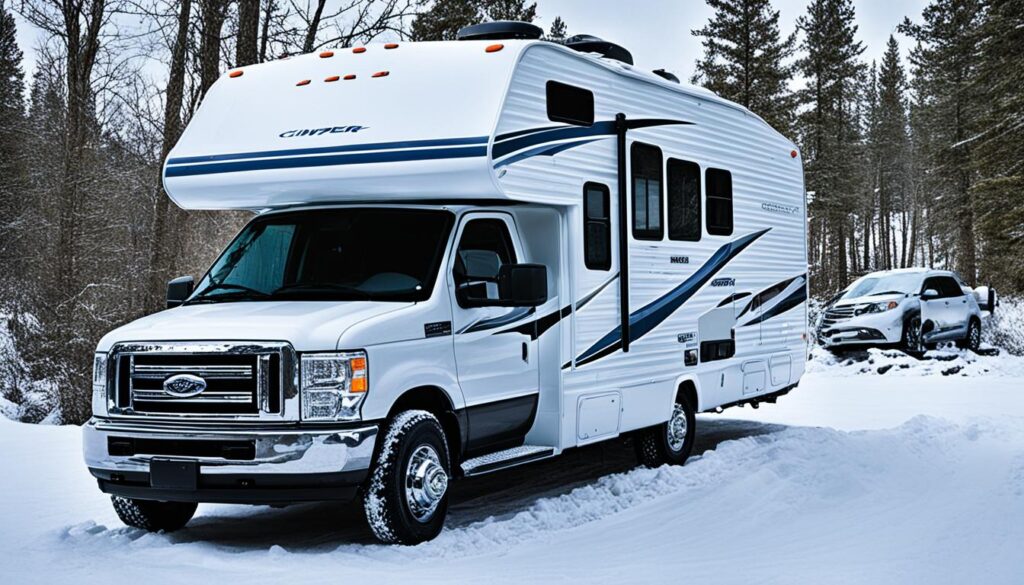
In conclusion, when it comes to storing a winterized camper, it’s important to choose the right location that offers protection from the elements and ensures the safety of your camper. Whether you opt for a driveway, home garage, enclosed storage unit, or utilize Neighbor’s self-storage marketplace, prioritize the security and preservation of your winterized camper. By doing so, you can rest assured that your camper will be in excellent condition when you’re ready to hit the road again.
How Long Can RV Antifreeze Be Stored?
RV antifreeze is a crucial component for winterizing your camper and protecting its plumbing system from freezing temperatures. But how long can you store RV antifreeze before it expires and becomes ineffective?
The shelf life of RV antifreeze typically ranges from 1 to 4 years when properly sealed and stored. It is important to check the expiration date on the bottle or inspect the product for signs of deterioration. To determine if the RV antifreeze has expired, give the bottle a gentle shake. If bubbles are observed, it indicates that the product has expired and should not be used.
Regularly checking the expiration date and condition of your RV antifreeze is essential to ensure its efficacy during the winterization process. Expired antifreeze may not provide adequate protection for your camper’s plumbing system, potentially resulting in costly repairs.
To maintain the longevity of your RV antifreeze, store it in a cool, dry place, away from direct sunlight and extreme temperatures. A sealed container will help prevent air exposure and maintain the antifreeze’s effectiveness.
Remember, using expired or ineffective RV antifreeze can lead to frozen pipes and costly damage. Always check the expiration date and quality of your RV antifreeze before winterizing your camper.
| RV Antifreeze Storage Tips |
|---|
| Check the expiration date |
| Give the bottle a gentle shake to check for bubbles |
| Store in a cool, dry place |
| Avoid direct sunlight and extreme temperatures |
Quote:
Using expired or ineffective RV antifreeze can lead to frozen pipes and costly damage.
Using and Living in a Winterized Camper
Living in a winterized camper requires careful planning and consideration to ensure a comfortable experience during the colder months. If your camper is equipped with a heated underbelly, winter camping becomes more feasible. By temporarily de-winterizing the camper, you can access all the amenities and utilities necessary for comfortable living. This includes using the plumbing system, water heater, and appliances without the risk of freezing.
After using the camper, it is important to re-winterize it promptly to protect it from potential damage caused by freezing temperatures. Following the proper winterization steps and using antifreeze to protect the plumbing system and water tanks will help ensure that your camper remains in good condition throughout the winter months.
Furthermore, driving an RV after it has been winterized is entirely possible. Many RV owners choose to winterize their campers at home before driving them to a storage facility. This not only ensures the camper’s protection during transportation but also allows for easier access to the storage facility when the need arises. Whether you’re taking a break from camping or simply need a safe place to store your winterized camper, this approach provides convenience and peace of mind.
FAQ
How long can a camper stay winterized?
The duration of winterization depends on the method used and the climate. In general, a camper can stay winterized for 2-3 years, even in freezing temperatures, but the condition of the camper upon de-winterization may vary depending on the method used.
What are the methods for winterizing a camper?
There are two main methods for winterizing a camper: using RV antifreeze or blowing out the lines.
How long can a camper stay winterized with RV antifreeze?
With RV antifreeze, a camper can stay winterized for a couple of years. The antifreeze keeps the seals and moving parts in good condition.
How long can a camper stay winterized with the blow out the lines method?
The blow out the lines method can also prolong winterization. However, it is important to use the proper tools and take preventive measures to ensure the camper remains in good condition during this extended period.
What maintenance should be done during winterization?
Performing preventive maintenance during winterization is crucial to prevent costly repairs. This includes inspecting seals, roofs, and plumbing system components, as well as protecting the plumbing system from freezing and preventing mold growth.
Where is the best place to store a winterized camper?
Options for storing a winterized camper include a driveway, home garage, enclosed storage unit, covered space in an RV storage yard or parking lot. Neighbor is a self-storage marketplace that offers a variety of indoor, outdoor, and climate-controlled options for winterized camper storage.
How long can RV antifreeze be stored?
RV antifreeze has a shelf life of 1 to 4 years if properly sealed and stored. It is important to check the expiration date or shake the bottle to determine if it has expired.
Is it possible to use and live in a winterized camper?
Yes, it is possible to use and live in a winterized camper with proper planning and consideration. If the camper has a heated underbelly, winter camping is feasible by de-winterizing the camper temporarily. After use, the camper can be re-winterized. It is also possible to drive an RV after it has been winterized.
